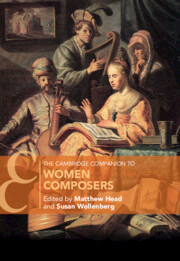Book contents
- The Cambridge Companion to Women Composers
- Cambridge Companions to Music
- The Cambridge Companion to Women Composers
- Copyright page
- Dedication
- Contents
- Figures
- Music Examples
- Contributors
- Acknowledgements
- Abbreviations
- Prologue
- Part I Themes in Studying Women Composers
- Part II Highlighting Women Composers before 1750
- Part III Women Composers circa 1750–1880
- 9 Did Women Have a Classical Style?
- 10 Women, Song, and Subjectivity in the Nineteenth Century
- 11 Women, Pianos, and Virtuosity in the Nineteenth Century
- Part IV Women Composers circa 1880–2000
- Bibliography
- Index
- References
9 - Did Women Have a Classical Style?
from Part III - Women Composers circa 1750–1880
Published online by Cambridge University Press: 23 May 2024
- The Cambridge Companion to Women Composers
- Cambridge Companions to Music
- The Cambridge Companion to Women Composers
- Copyright page
- Dedication
- Contents
- Figures
- Music Examples
- Contributors
- Acknowledgements
- Abbreviations
- Prologue
- Part I Themes in Studying Women Composers
- Part II Highlighting Women Composers before 1750
- Part III Women Composers circa 1750–1880
- 9 Did Women Have a Classical Style?
- 10 Women, Song, and Subjectivity in the Nineteenth Century
- 11 Women, Pianos, and Virtuosity in the Nineteenth Century
- Part IV Women Composers circa 1880–2000
- Bibliography
- Index
- References
Summary
The extraordinary growth of scholarship on women composers in recent decades inspires not only female inclusion in traditionally all-male historical narratives but also reappraisal of the period styles that structure those narratives. Does the music of women composers follow patterns of change enshrined in such heirloom categories of music history as Medieval, Renaissance, Baroque, Classical, and Romantic? What is the critical potential of women’s work as composers for rewriting music-historical surveys? With the music of around 400 female composers of the eighteenth century now known to survive, the field is established for the appraisal of women composers’ relationship to the Classical period, and the ‘Viennese Classical Style’ associated with it.1
The formerly dependable terms invoked thus far – period, Classical, Viennese, and style – deserve rethinking.
- Type
- Chapter
- Information
- The Cambridge Companion to Women Composers , pp. 161 - 182Publisher: Cambridge University PressPrint publication year: 2024

